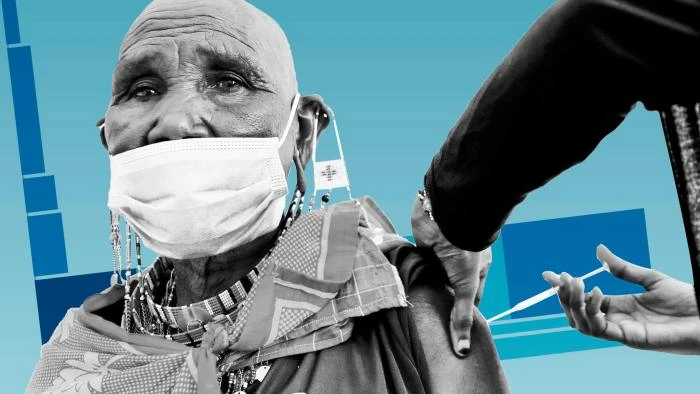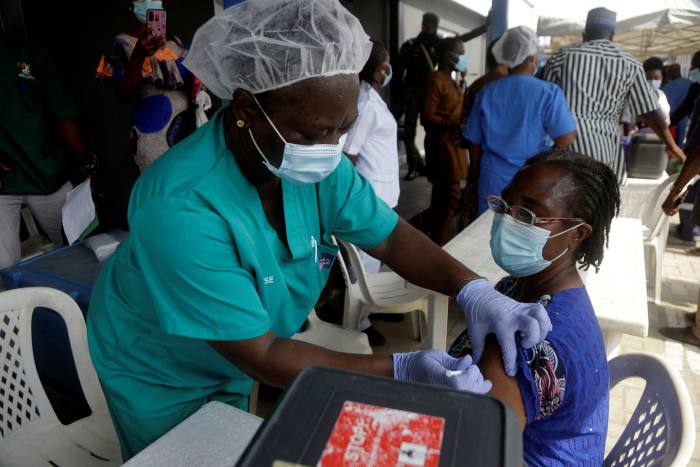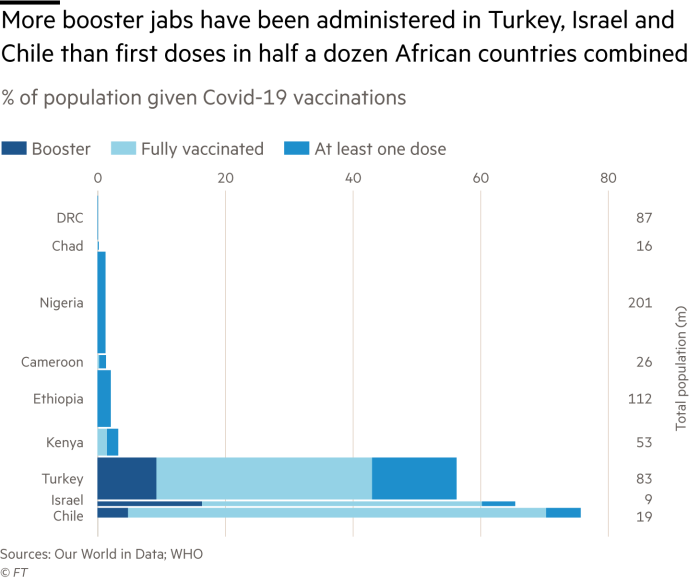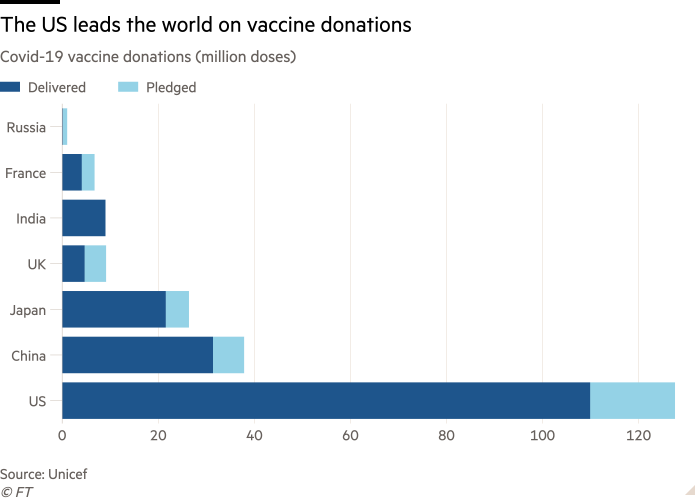
Wealthy countries are finalising plans to roll out coronavirus booster programmes to counter the threat from waning vaccine immunity, decisions that will further squeeze the supplies available to the developing world.
France this week joined the US and at least two dozen other countries by confirming it would administer third vaccine doses — capping the debate over the use of boosters that has rolled on all summer.
Doing so has meant going against the World Health Organization, which has called for a moratorium on boosters and for any spare doses to be given to less-vaccinated countries. Tedros Adhanom Ghebreyesus, WHO director-general, this week questioned whether boosters were “effective at all”, insisting they should only go to those with weakened immune systems.
A Financial Times analysis of programmes in Israel, Turkey and Chile, three of the countries giving out boosters, show in excess of 10m have been deployed, more than the total vaccine doses administered in half a dozen African nations combined.

Nigeria and Ethiopia, Africa’s two most populous countries, as well as Chad, Cameroon, the Democratic Republic of Congo and Kenya have vaccinated a combined 9.37m people, which includes supplies received as part of the Covax vaccine sharing scheme. Only two per cent of Africa’s population has been fully vaccinated, the lowest coverage of any continent.
Andrew Pollard, director of the Oxford Vaccine Group that created the Oxford/AstraZeneca jab, said the rush to dispense boosters was driven by an “understandable desire to de-risk the future as much as possible”.
But he stressed that without “clear evidence” of falling protection against severe disease among the double-vaccinated, the case for booster jabs was just not there.
Recent Oxford university and King’s College London’s Zoe Covid studies found that the protection against symptomatic infection offered by the BioNTech/Pfizer vaccine and the Oxford/AstraZeneca jab waned four-five months after the second dose.

This suggests “breakthrough infections” are becoming more likely in vaccinated people, but neither study observed a loss of effectiveness in preventing hospital admission and death.
“If you look at it in simple terms, if we give a third dose to anyone today that is then denying a dose to someone who has none,” Pollard said, adding that the benefits of boosting was “marginal” compared with vaccinating countries with “zero protection”.
However, a study this week from Israel’s health ministry did provide evidence of waning immunity against severe disease. It showed a person aged over 60 who received their second dose in March was 1.7 times more protected against severe Covid-19 than those who received it in January.
Peter Hotez, professor of virology at the Baylor School of Medicine in the US city of Dallas, said western governments were “rightly” pressing ahead with Covid-19 booster programmes, based on the assumption that the decline in effectiveness against infection was just “the tip of the spear”.
“This could very well transfer into breakthrough hospitalisations in the near future and boosters are the only way to avert that,” Prof Hotez said. “Protecting your people is part of any leader’s job description.”

US regulators are set to approve a plan to offer boosters to Americans eight months after their second shot, or one shot in the case of the Johnson & Johnson vaccine. More than 100m people would be eligible by year-end.
Germany and France have also set dates for their booster campaigns to begin. The UK health service has begun planning for a booster campaign but government vaccine advisers look set to initially authorise third doses to the clinically vulnerable.
Israel has led the pack, having begun offering booster shots last month. Ran Balicer, head of the government’s national Covid advisory committee, said the programme was a “measure of last resort to avert an impending catastrophe”.
“This wasn’t a decision that was taken lightly,” he said. “It took quite a while to understand that the pressure on our hospitals from fully vaccinated people being admitted was acute enough to justify this measure.”

More than 70 per cent of Israel’s over-60s have been administered with boosters and 44 per cent of 50 to 59-year-olds have received a third shot after eligibility was expanded in the middle of this month.
Balicer predicted that “hundreds of millions of third doses” would be dispensed worldwide as countries sought to limit the impact of the more infectious Delta variant.
John Nkengasong, director of the Africa Centres for Disease Control and Prevention, said using vaccines for booster campaigns instead of sharing them with countries with low vaccine coverage and high transmission was a “serious miscalculation”.
“It gives the opportunity for new variants to emerge that will eventually challenge countries that are fully vaccinated,” he said.
Booster programmes were an example of western nations “prioritising” the wish to stop mild cases at home over preventing deaths in poorer nations. “We have normalised deaths in developing countries,” he said. “I fear Africa could become the continent of Covid.”




















